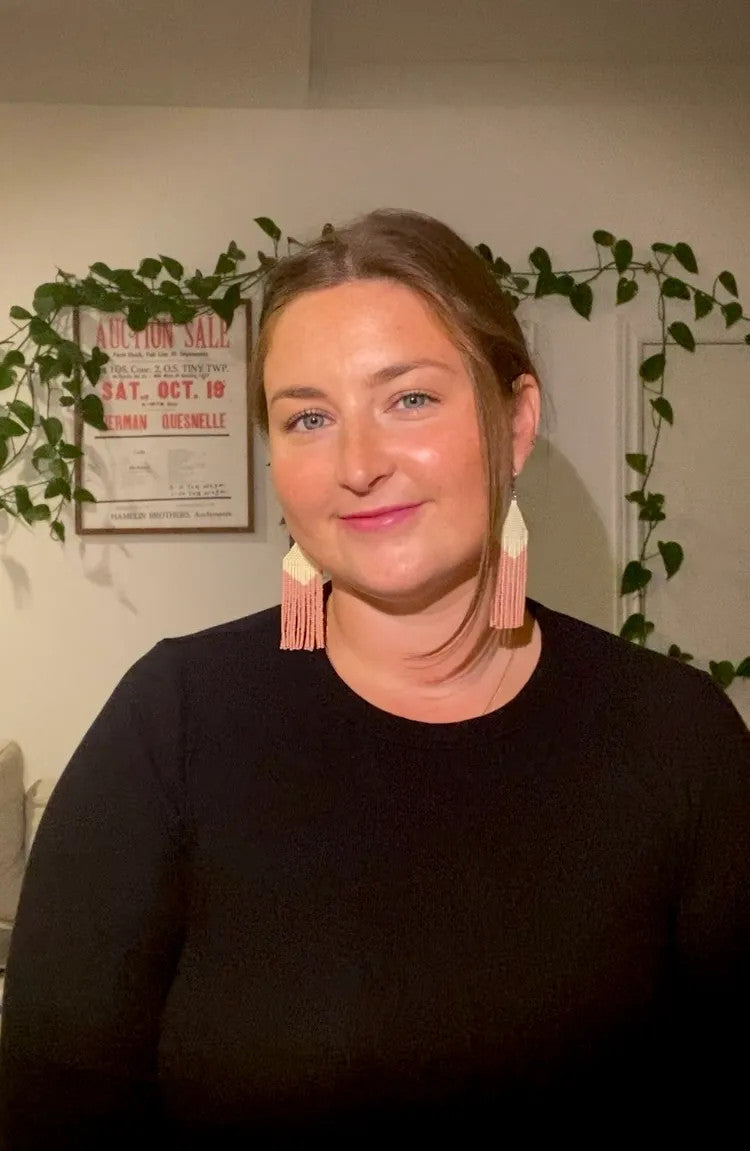

Today is the National Day for Truth and Reconciliation. It is also known as orange shirt day, as originated by Phyllis Webstad, a survivor of the Canadian residential school system. It is an opportunity to discuss and recognize the impacts of residential schools in Canada on Indigenous peoples. Our Impact Program allows us to connect with people like Emily, of Spill the Beads, to hear more about their stories and personal initiatives.
Emily is a Métis beader and owner of Spill the Beads. She celebrates her Métis heritage through traditional beading practices and sells her handmade designs on Etsy.
In recognition of National Day of Truth and Reconciliation, Diva commissioned Emily to create a special pair of earrings. These earrings can be purchased here and all proceeds will go to the Indian Residential School Survivors Society of Canada.

Métis People and Powley Day
It feels special to note that we had the pleasure of meeting with Emily on September 19th, also known as “Powley Day”. Powley Day celebrates the anniversary of the landmark rights victory of Métis people at the Supreme Court of Canada. Emily is a proud citizen of the Métis Nation of Ontario.
Spill the Beads and Finding Her Indigenous Identity
Emily started Spill the Beads in 2021 after taking part in a traditional beading workshop. While both of her parents are Métis, for a long time Emily felt confused and disconnected from her ancestry. Colonization meant that growing up, Emily “knew it existed but never celebrated it”. The journey to discovering her heritage was a complicated one.
Through her beading, Emily found a way to connect with her culture that was both artistic and therapeutic. It gave her the opportunity to share beautiful pieces with loved ones and strangers alike.
“I feel lucky to be reconnecting to my culture in a way that, for the first time ever, feels right. This journey of reconnecting has felt complicated for me. Learning to bead and beading helps me to feel connected in a way that I’ve never really felt.”
Learning and Embracing Culture
This experience is not unusual for Indigenous, First Nations, Inuit, and Métis people. Emily, through her journey and learning, established her connection to her Métis heritage and now celebrates her ancestry through art. Through her beading, she connects with Métis people with similar experiences and is growing into the identity she was separated from.
“I think it’s a very common feeling. And I think, especially for people who are white-presenting, to feel disconnected from our culture. I often have this conversation with other Métis, who also have this feeling of wanting to rediscover and reconnect. But also feeling like an outsider. And in some ways, this makes it even more important that we continue to learn about and embrace our culture and communities.”
Spill the Beads Impact
In recognition of the National Day for Truth and Reconciliation, Emily has designed orange beaded earrings. They are for sale on Etsy. 100% of the proceeds will go to the Indian Residential School Survivors Society of Canada. This organization provides resources to survivors of the residential school systems, their families and people dealing with intergenerational traumas.
Calls to Action on National Day of Truth & Reconciliation in Canada
The Truth and Reconciliation Commission of Canada’s report recognizes 94 Calls to Action, put forth to “redress the legacy of residential schools and advance the process of Canadian reconciliation”.
Emily, as a member of the Métis Nation shares her art as a way of bringing attention to the traditions of her Métis ancestors and celebrating her heritage. And draws our attention to CTA #20, which calls upon the federal government to “recognize, respect, and address the distinct health needs of the Métis, Inuit, and off-reserve Aboriginal peoples”.
On this National Day of Truth and Reconciliation, Diva contributes to the efforts of our partners at Water First. Through our partnership with Water First, we have donated $12,500 this year to support their initiatives. Water First works to help “address water challenges in Indigenous communities in Canada through education, training and meaningful collaboration.”
Resources for Truth and Reconciliation in Canada
If you’re looking for further information, Emily personally recommends The 21 Things You May Not Know About the Indian Act: Helping Canadians Make Reconciliation with Indigenous Peoples a Reality, written by Bob Joseph, as a tangible resource.
Visit our website to learn more about our Impact Program.















